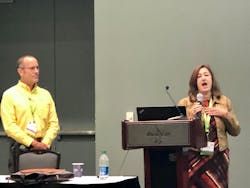Aschinger Electric and Azimuth Energy’s Team Approach to Solar Projects
Emily Martin’s St. Louis-based Aschinger Electric has completed more than 100 solar projects for commercial, industrial, institutional, not-for-profit, and utility clients throughout the Midwest, and she still hasn’t found someone who does solar just because it feels good. Martin says her customers will install solar only after it can generate a reasonable financial payback.
To help her company do that, she often works on these projects with Mark Lopato, president of Azimuth Energy, Fenton, MO. In their NECA seminar on October 11, “Winning Profitable Solar-Energy and Battery Projects,” Martin and Lopato offered attendees an insightful analysis of what customers want in solar and storage battery installations. Martin partners with Lopato’s firm because of its expertise in payback analysis, engineering, procurement, familiarity with state and local incentives, product selection, and warranties, so her company can focus on the installation of these systems. Azimuth has completed more than 500 solar projects around the world, including 20 utility photovoltaic and battery projects and 80 microgrid and energy storage projects totaling over 95 MWh of energy storage capacity.
Lopato’s company sources solar panels from all over the world and is currently working with a manufacturer in Cambodia. He works with a solar product testing firm who has a person on site there to check production runs of these panels and says that because his testing program ensures that he has quality PV panels on Azimuth Energy’s projects, he very seldom has any quality control issues with them on-site. In fact, he says that he has significantly more problems with faulty inverters than he ever has with panels.
Lopato also offered attendees some other tips for their solar installations:
- Double check which edition of the National Electrical Code the local jurisdiction is using because there are differences in the requirements for solar installations.
- Makes sure whips are compatible with the panels and inverters. Installing a mismatched whip is a potential fire issue.
- Lack of expansion fittings and ground fault issues are two other potential safety problems if equipment is not installed properly.
- Check with the local electrical inspector on what type of rapid shutdown controls should be used.
Lopato and Martin said more customers are interested in battery storage projects and that although lithium-ion batteries continue to be the battery of choice for many applications, lead-acid batteries are appropriate for some jobs.
About the Author
Jim Lucy
Editor-in-Chief, Electrical Wholesaling & Electrical Marketing
Over the past 40-plus years, hundreds of Jim’s articles have been published in Electrical Wholesaling, Electrical Marketing newsletter and Electrical Construction & Maintenance magazine on topics such as electric vehicles, solar and wind development, energy-efficient lighting and local market economics. In addition to his published work, Jim regularly gives presentations on these topics to C-suite executives, industry groups and investment analysts.
He launched a new subscription-based data product for Electrical Marketing that offers electrical sales potential estimates and related market data for more than 300 metropolitan areas. In 1999, he published his first book, “The Electrical Marketer’s Survival Guide” for electrical industry executives looking for an overview of key market trends.
While managing Electrical Wholesaling’s editorial operations, Jim and the publication’s staff won several Jesse H. Neal awards for editorial excellence, the highest honor in the business press, and numerous national and regional awards from the American Society of Business Press Editors. He has a master’s degree in communications and a bachelor’s degree in journalism from Glassboro State College, Glassboro, N.J. (now Rowan University) and studied electrical design at New York University and graphic design at the School for Visual Arts.


